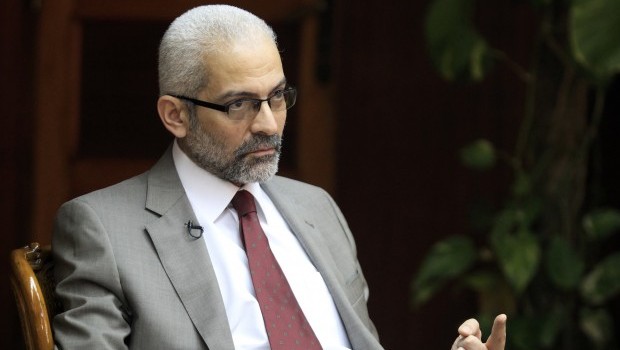
Alaa Abdel Aziz, Egypt’s new culture minister, speaks during an interview in Cairo, June 17, 2013. (REUTERS/Mohamed Abd El Ghany)
Artists enraged that he fired the head of Cairo Opera, and fearing Muslim puritans may ban ballet, have barricaded Alaa Abdel Aziz from entering his own ministry.
The “culture war” has come to symbolize a wider conflict between the Islamist government and secular opponents ahead of rival mass rallies later this month to mark the first anniversary in power of President Mohamed Mursi.
Speaking at the dusty state publishing house where he has set up camp, Abdel Aziz told Reuters he would ban nothing. Rather, he would support “people’s art” beyond the capital, end corruption inherited from the old regime and see that cultural spending reflects how democratic revolution has changed Egyptian society.
“My concern is providing cultural services throughout Egypt, not financial benefits for a few intellectuals,” he said in an interview, justifying high-profile dismissals that have prompted the sit-in, and occasional scuffles, at the Culture Ministry.
As for his own tastes, the 52-year-old academic cites films by Japanese master Akira Kurosawa, Iranian and French cinema, and the work of American director Terrence Malick.
One favorite is Martin Scorsese’s Gangs of New York—perhaps appropriately, a Civil War-era tale of upstart incomers and corrupt, entrenched interests battling for power on the streets of a new country.
That taste for Hollywood sets Abdel Aziz apart from some allies of Mursi and his Muslim Brotherhood, who have used the power they won in elections since the 2011 revolution to urge an end to public displays of ballet or belly-dancing, or even censorship of on-screen romance.
To his opponents, Abdel Aziz is an artistic nobody, a know-nothing pawn of the Brotherhood, bent on an Islamic morality campaign that threatens a cosmopolitan cultural scene long envied across the socially conservative Arab world. The truth, he says, has more to do with vested interests than artistic freedom.
“Very simply, I am from outside the traditional cultural community which has controlled Egyptian cultural life for long decades,” he said. “That poses a kind of threat to them.”
He accused opponents of spreading lies about him and called some of the criticism “frightening and barbaric”.
“The revolution took place to create change in society,” he said. “And culture also has to change to keep pace with that.”
After Abdel Aziz removed the French-trained flautist who had run the Opera House complex for the past year, a performance of Verdi’s set-in-Egypt “Aida” was replaced by a protest by singers and musicians against the “Brotherhoodization” of culture.
Now the fate of ballerinas has become an unlikely rallying cry for millions who say they will join street protests to mark Mursi’s anniversary on June 30.
His year in office has been marked by complaints that the Brotherhood has leveraged its organizational muscle into dominating political institutions, and now wants to impose its social views on the less cohesive liberal factions which were its allies in toppling veteran ruler Hosni Mubarak.
But Abdel Aziz, a member of a small Islamic party, laughed off fears of Islamist “colonization” of the administration. He said anyone “competent and trustworthy” was welcome in it, “whether Muslim Brother or . . . Marxist or liberal.”
Nor was he out to censor, as his opponents feared: “With the opera and ballet, this isn’t about wanting to abolish anything; we are addressing . . . administrative failure,” he said.
“When there’s a ballet on in a theater that seats 620 and only eight seats are booked, that’s a disaster . . . Yet when measures are taken to address those errors, you find yourself confronted by these ferocious, frightening, barbaric attacks.”
Budgets are still under review and it is unclear whether Abdel Aziz may divert resources beyond the big cities. “People’s art” is a priority—”art that has a public to receive it”.
He would like to help Egypt’s film industry back to the heyday it last enjoyed in black and white, but takes a global view. “I care about all kinds of cinema,” he said. “I watch Hollywood cinema as much as I watch Iranian cinema, or French cinema.
“I’m very interested in cinema that critiques society, like Scorsese’s Gangs of New York—one of the films I love.”
As the army prepares to prevent rival camps shedding blood on the streets of Cairo, Abdel Aziz said protest was fine, but accused opponents in the culture war of fighting dirty.
“I don’t object to protests because I was once a protester myself and took part in sit-ins,” he said of his exile from the ministry. “But the problem is when you lie.”
